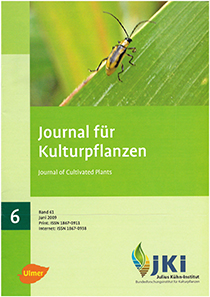Influence of feed supplementation with <i>Tropaeolum majus L.</i> on growth performance and urine isothiocyanate concentration of piglets
DOI:
https://doi.org/10.5073/JfK.2009.06.03Keywords:
Tropaeolum majus, Pigs, Glucotropaeolin, SupplementationAbstract
Tropaeolum majus L. is a herb with antimicrobial activity in humans, caused by the degradation product benzyl-isothiocyanate derived from enzymatic cleavage of glucotropaeolin. Piglets were fed diets with a graded supplementation of Tropaeolum majus for five weeks. Tropaeolum majus was supplemented at an upper dosage level of 1 g/kg with the feed, equaling 48.7 mg/kg glucotropaeolin, which resulted in a benzyl-isothiocyanate concentration in the urine of up to 2.4 mg/L, which is high enough to control a broad range of bacteria. On average 3.1 – 7.3% of the glucotropaeolin taken up by the animals was excreted as bioactive benzyl-isothiocyanate. Supplementation of the feed with Tropaeolum majus had no effect on growth performance of piglets.
Published
Issue
Section
License
The content of the journal is licensed under the Creative Commons Attribution 4.0 License. Any user is free to share and adapt (remix, transform, build upon) the content as long as the original publication is attributed (authors, title, year, journal, issue, pages).
The copyright of the published work remains with the authors. The authors grant the Journal of Cultivated Plants, the Julius Kühn-Institut and the OpenAgrar repository the non-exclusive right to distribute and exploit the work.







